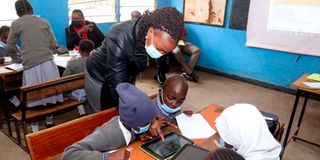Premium
State to pay for teachers’ training courses

Pauline Musyoka a teacher at Mariakani Primary School in Nairobi shows Grade 3 pupils how to use a tablet during an e-learning lesson on September 8, 2021.
Teachers are breathing a sigh of relief following revelations that the government will meet the cost of the controversial Teacher Professional Development (TPD) training that was introduced by their employer last year.
Sh2 billion has been factored in the 2021/2022 supplementary budget and, if approved by Parliament, will take the burden off the teachers’ shoulders.
Teachers protested when they were told that they would have to pay Sh6,000 annually for each of the six modules they are meant to cover over a period of five years. This means that, without the government bearing the cost of the training, a teacher would have had to pay Sh180,000 for the entire period.
“As a committee, we agreed that we get this money from the Ministry of Education. We will now fight for the money to be included in the main budget,” Ms Florence Mutua, the chair of the Education and Research Committee of the National Assembly, revealed yesterday when the Teachers Service Commission (TSC) officials appeared before the MPs at a Nairobi hotel on Wednesday.
Budget estimates
The committee was reviewing proposals to the supplementary budget estimates from the Ministry of Education and the TSC.
The allocation follows a petition in Parliament by Emuhaya MP Omboko Milemba, who is a member of the committee, and also the national chair of the Kenya Union of Post Primary Education Teachers (Kuppet).
“Education is for public good and public consumption so we can’t surcharge teachers. TSC should treat it the same way it treats training for CBC. It is now in the hands of MPs to either say aye or nay, but we shall be defending it on the floor of the house,” Mr Milemba told the Nation yesterday. Under the TPD programme that began in December last year, teachers are required to undertake an upskilling module every five years or risk losing their teaching licences. Teachers will go through the training during the school holidays.
The lucrative deal to train close to 500,000 teachers is currently being offered through four institutions: Kenyatta University, Riara University, Mt Kenya University and the Kenya Education Management Institute. TSC has employed 341,760 teachers while about 150,000 others work in private schools and many others are unemployed.
According to TSC, only the four were considered after other top universities gave the tender a wide berth, while others were knocked out on technicalities. The contract is for one year and the commission expects more universities to apply when they advertise for the next one.
MPs demanded to know whether teachers who have already started the training would be refunded the fees already paid.
“Once there is direction and funding, the commission will retreat to look at what happens to the teachers who are already enrolled and are undergoing the training,” said Mr Cheptumo Ayabei, the TSC director of finance.
Training
TSC had planned to roll out the programme in 2018 but the plan was derailed following a court case filed by the Kenya National Union of Teachers demanding that TSC pays for the teachers’ training. The case was withdrawn by the new leadership of the union which assumed office in June.
Mr Milemba also asked the TSC to consider changing the service provider for the multibillion-shilling medical scheme which has been administered by Minet Kenya since its inception in 2015. He said teachers are dissatisfied with the services they receive.
Mr Ayabei said the request could only be considered at the tendering stage since it is an open competitive tender process and only those who emerge top are considered.
Ms Mutua directed TSC to provide the committee with a list showing how teachers are distributed across the country in order to determine the staffing needs. The list, she said, should be based on the sub-counties.





